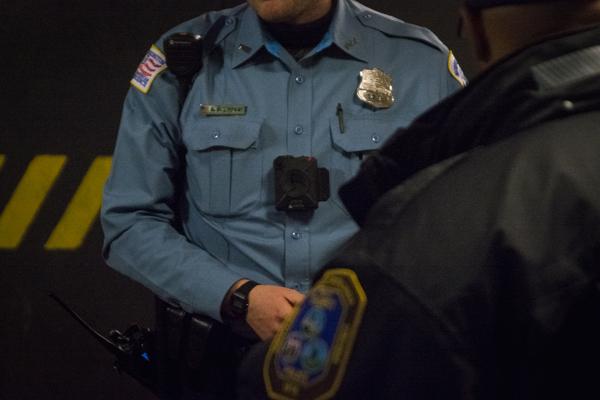This Friday will be the first presidential inauguration with all Metropolitan Police Department patrol officers wearing body cameras.
Officials from MPD said officers will film all encounters with people during the inauguration, as they did during regular patrols, and suggested people and protesters will be less likely to act violently if they know the police monitoring them are outfitted with body cameras. Still, D.C. Police Union leaders are pushing for limited access to the footage, saying releasing it could jeopardize and influence the outcome of cases.
MPD sends footage of events like officer-involved shootings to the mayor’s office, and Mayor Muriel Bowser can then release footage if the video is of public interest, even if the incident is under investigation. She has released footage four times during her tenure as mayor, Helder Gil, the chief of staff for the deputy mayor for public safety and justice and a member of The Hatchet’s Board of Directors, said.
“There is a totally unbiased recording of what occurred to reflect the reality of what occurred during an interaction between an individual and an officer,” he said.
Gil added that D.C. has one of the most progressive footage access policies nationally.
Bowser originally did not want the footage under public record but changed her mind in 2015 after an increase in officer shootings nationally.
While there is generally public want and interest in the footage, not all officers agree with the transparency of releasing footage.
Russell Mullins, the executive steward of the D.C. Police Union, said the union believes releasing footage of an open investigation can allow the media, government or interest groups to influence potential jurors and hearing examiners and prevent them from remaining objective. The union has suggested to city officials to not release videos in such cases, he said.
“[Once] we start giving people evidence in a case, whether it be civil or criminal suit, it changes the whole outlook of the investigation,” he said.
Mullins said that from his experience wearing a camera while patrolling, citizens behave better when they know they are being filmed, which will most likely affect how protesters act during inauguration-related events.
“It would calm the protesters that are there specifically to do something illegal or that are there specifically to disrupt,” he said.
Michael Broder, a clinical psychologist who worked with the Philadelphia Police Department for five years, said more studies need to be done to determine whether officers change their approaches when they are being recorded.
“I think crime prevention is a very big part of policing, and when that is compromised, there are victims,” he said.
In 2014, MPD launched a pilot program, which lasted about a year and cost D.C. $1 million, in which more than 400 officers volunteered to record their interactions with citizens, Washington City Paper reported. Bowser then signed her approval for the $5.1 million extension of the original program in 2015, The Washington Post reported.
MPD had supplied all 2,600 patrol officers with body-worn cameras by Dec. 15, which makes the department the one with the most body-worn cameras nationally, according to a press release from the mayor’s office.
MPD spokeswoman Rachel Reid said researchers are working with the department on a study, currently set to be published this spring, to determine how body cameras affect on-duty officers’ actions.
Reid declined to give the number of officers that will wear body cameras at the inauguration, citing a department policy not to reveal operational tactics.




